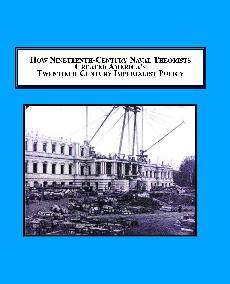This is our backup site. Click here to visit our main site at MellenPress.com
How the Nineteenth Century Naval Theorsts Created America's Twentieth Century Imperialist Policy

| Author: | Haugen, Douglas Mark | |
| Year: | 2010 | |
| Pages: | 228 | |
| ISBN: | 0-7734-1416-9 978-0-7734-1416-7 | |
| Price: | $179.95 | |
This work is the first comprehensive contribution to studies in American political
development with an international focus. This book explores the conditions that
produced foreign policy change, by examining the intellectual development within naval reform communities. Special emphasis is placed upon bureaucratic autonomy, organizational competition, and the reformulation of strategic doctrine.
Author’s Abstract:
Preemption and state building, we have been told, are necessary for the application of U.S. military power to promote democracy in strategic areas throughout the world. Why? What is the origin of this assumption? Moreover, what transformed U.S. foreign policy - from a doctrine of isolation, to a doctrine of parity, to one of containment, to one of global Empire? I will consider the first question in light of late nineteenth-century military doctrine. I evaluate competing explanations of naval reform and U.S. foreign policy during the period. I contend that current explanations are inadequate and fail to locate the mechanism of policy change.
Chapters four, five, and six trace the development of an epistemic community that began operational planning during the 1880s. The community forged an intellectual consensus and created support networks to act upon their preferences. Chapters four and five trace the pattern of battleship advocacy from 1889 until 1896, focusing upon the process by which the community mobilized support to advance battleship legislation. Bureaucratic entrepreneurship captured political and special interest support, however, bureaucratic entrepreneurship did not require demonstrated capacity. Chapter six details the triumph of the imperial doctrine. The conclusion will speculate how my state-centered approach might apply to different services, in different periods.
Author’s Abstract:
Preemption and state building, we have been told, are necessary for the application of U.S. military power to promote democracy in strategic areas throughout the world. Why? What is the origin of this assumption? Moreover, what transformed U.S. foreign policy - from a doctrine of isolation, to a doctrine of parity, to one of containment, to one of global Empire? I will consider the first question in light of late nineteenth-century military doctrine. I evaluate competing explanations of naval reform and U.S. foreign policy during the period. I contend that current explanations are inadequate and fail to locate the mechanism of policy change.
Chapters four, five, and six trace the development of an epistemic community that began operational planning during the 1880s. The community forged an intellectual consensus and created support networks to act upon their preferences. Chapters four and five trace the pattern of battleship advocacy from 1889 until 1896, focusing upon the process by which the community mobilized support to advance battleship legislation. Bureaucratic entrepreneurship captured political and special interest support, however, bureaucratic entrepreneurship did not require demonstrated capacity. Chapter six details the triumph of the imperial doctrine. The conclusion will speculate how my state-centered approach might apply to different services, in different periods.
Reviews
“[T]he book demands a paradigmatic
adjustment in how we understand the origins of American imperialism.”
– Ruth O’Brien
“Haugen’s close attention to the ‘how’ of major policy innovation leads to a fresh perspective on both state development within the United States and military expansion of an emerging world power within the international system.”
– Prof. Andrew J. Polsky, Hunter College
– Ruth O’Brien
“Haugen’s close attention to the ‘how’ of major policy innovation leads to a fresh perspective on both state development within the United States and military expansion of an emerging world power within the international system.”
– Prof. Andrew J. Polsky, Hunter College
